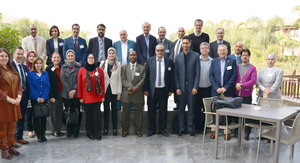 14 January 2018 – The World Health Report: “Research for Universal Health Coverage” (2013) emphasized WHO’s role in advancing research that addresses the dominant health needs of its Member States, supporting national health research systems, setting norms and standards for the proper conduct of research and accelerating translation of research findings into health policy and practice. Therefore, it is crucial to build WHO staff capacity, at the regional and country level, on research methods and ethics to help different technical programmes provide support to Member States in addressing evidence gaps pertinent to strategy and policy development.
14 January 2018 – The World Health Report: “Research for Universal Health Coverage” (2013) emphasized WHO’s role in advancing research that addresses the dominant health needs of its Member States, supporting national health research systems, setting norms and standards for the proper conduct of research and accelerating translation of research findings into health policy and practice. Therefore, it is crucial to build WHO staff capacity, at the regional and country level, on research methods and ethics to help different technical programmes provide support to Member States in addressing evidence gaps pertinent to strategy and policy development.
In collaboration with Staff Development and Learning Programme, a workshop was conducted from 5 to 6 December 2017 to:
- introduce basic concepts and methods central to conduct of health research;
- discuss ethical principles in conducting research involving human subjects; and
- emphasize the importance and utility of translating research evidence into practice.
Participants included various technical staff from the WHO Regional OIffice and country offices (Afghanistan, Jordan, Iraq, Morocco, Pakistan, Sudan). It was facilitated by Dr Arash Rashidian, Director, Information, Evidence and Research; Dr Ahmed Mandil, Coordinator, Research Development and Innovation; Dr Samar ElFeky, Technical Officer, Research Promotion and Development, and Mr Hatem Noureddin, Technical Officer, Knowledge Sharing and Publishing.
Topics discussed included:
- contemporary health research;
- ethics in health research;
- study designs (qualitative and quantitative);
- searching biomedical literature; sampling and data collection;
- appraisal and dissemination of research outcomes.


